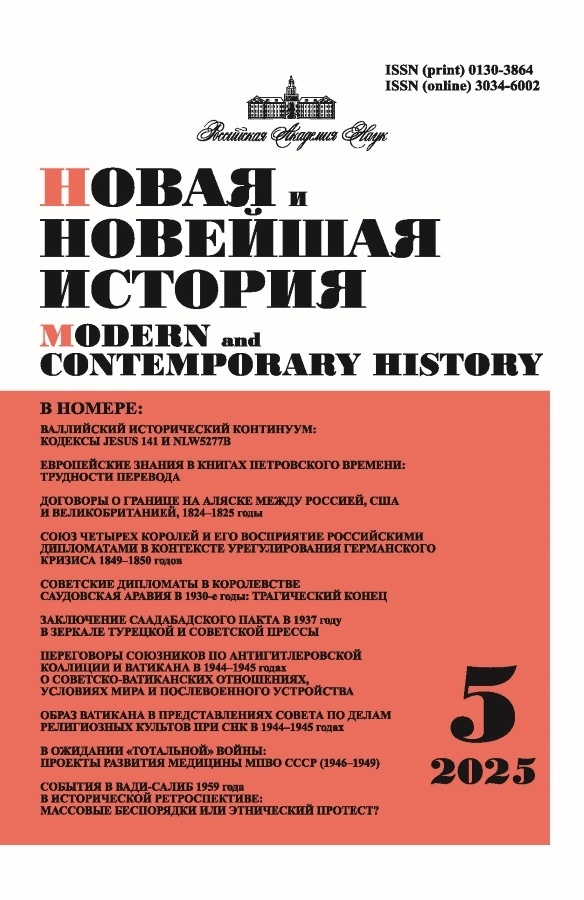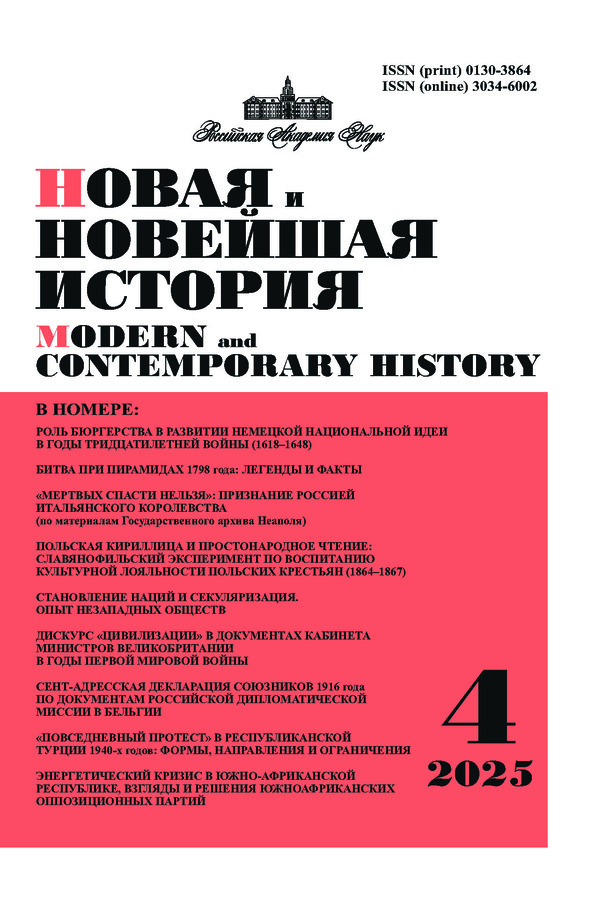The Particular Methodology of Historical Science
- Authors: Bobkova M.S.1
-
Affiliations:
- Institute of World History, Russian Academy of Sciences
- Issue: No 4 (2025)
- Pages: 210-218
- Section: Messages
- URL: https://rjdentistry.com/0130-3864/article/view/691870
- DOI: https://doi.org/10.31857/S0130386425040159
- ID: 691870
Cite item
Abstract
This article examines the treatment of historical typology in an unpublished manuscript by Mikhail Abramovich Barg (1915–1991). The relevance of this subject remains significant, particularly in relation to the conceptualisation of historical periodisation – that is, the construction of temporal frameworks within the context of historical space and the formation of a global image of the past. Barg’s manuscript is noteworthy for identifying the immanent foundations of the theory of historical knowledge, as well as the methodological approaches derived from these foundations, which place typology at the forefront of efforts to understand and define historicism.
Even at the lowest levels of abstraction and in closest proximity to empirical reality, it scarcely requires argument that the proper subject of historical inquiry is neither “personalities”, nor “events”, nor isolated “cause-and-effect” relationships. Rather, it is the spatio-temporal unfolding of society
conceived as an integral whole – and therefore to be analysed in all its interconnections, structures,
and contextual dimensions. The approach articulated by Barg prioritises an analysis of the categorical
and substantive structures inherent in historical phenomena over considerations of superficial
resemblance. Contemporary historiography has devoted relatively little attention to historical typology
as a category of historical knowledge. Yet this neglect represents a significant gap in scholarship,
particularly in light of the globalisation of regional histories and the resulting demand for theoretical tools capable of synthesising diverse historical experiences within a coherent analytical framework.
Even at the lowest levels of abstraction and in closest proximity to empirical reality, it scarcely requires argument that the proper subject of historical inquiry is neither “personalities”, nor “events”, nor isolated “cause-and-effect” relationships. Rather, it is the spatio-temporal unfolding of society
conceived as an integral whole – and therefore to be analysed in all its interconnections, structures,
and contextual dimensions. The approach articulated by Barg prioritises an analysis of the categorical
and substantive structures inherent in historical phenomena over considerations of superficial
resemblance. Contemporary historiography has devoted relatively little attention to historical typology
as a category of historical knowledge. Yet this neglect represents a significant gap in scholarship,
particularly in light of the globalisation of regional histories and the resulting demand for theoretical tools capable of synthesising diverse historical experiences within a coherent analytical framework.
About the authors
M. S. Bobkova
Institute of World History, Russian Academy of Sciences
Email: bobkova_marina@list.ru
Moscow, Russia
References
- Barg M.A. Aktual’nye voprosy marksistskogo istorizma (prikladnaya metodologiya istorii). Mashinopis’ [Current issues of Marxist historicism (applied methodology of history)]. Typescript. Ne opublikovana [Not published]. (In Russ.)
- Barg M.A. Epokhi i idei. Stanovlenie istorizma [Epochs and ideas. Making of historicism]. Moskva, 1987. (In Russ.)
- Barg M.A. Kategorii i metody istoricheskoj nauki [Categories and methods of historical science]. Moskva, 1984. (In Russ.)
- Barg M.A. Kategoriya “tsivilizatsiya” kak metod sravnitel’no-istoricheskogo issledovaniya (Chelovecheskoe izmerenie) [The category of “civilization” as a method of comparative historical research (Human dimension)] // Istoriya SSSR [History of the USSR]. 1991. № 5. S. 70–86. (In Russ.)
- Barg M.A. O kategorii “tsivilizatsiya” [About the category “civilization”] // Novaya i Novejshaya Istoriya [Modern and Contemporary History]. 1990. № 5. S. 25–40. (In Russ.)
- Barg M.A. Tsivilizatsionnyj podkhod k istorii: dan’ kon’yunkture ili trebovanie nauki? [Civilizational approach to history: a tribute to the situation or a requirement of science?] // Tsivilizatsii [Civilizations]. Vyp. 2. Moskva, 1993. S. 8–17. (In Russ.)
- Barg M.A., Chernyak Ye.B. Velikie sotsial’nye revolyucii XVII–XVIII vekov [Great social revolutions of the 17th–18th centuries]. Moskva, 1989. (In Russ.)
- Bobkova M.S. Istoriopisanie epohi katastrof [History writing of the era of catastrophes]. Moskva, 2007. (In Russ.)
- Hegel G.W.F. Sochinineiya [Works]. Moskva, 1934. (In Russ.)
- Zhukov E.M., Barg M.A., Chernyak Ye.B., Pavlov V.I. Teoreticheskie problemy vsemirno-istoricheskogo processa [Theoretical problems of the world-historical process]. Moskva, 1979. (In Russ.)
Supplementary files











